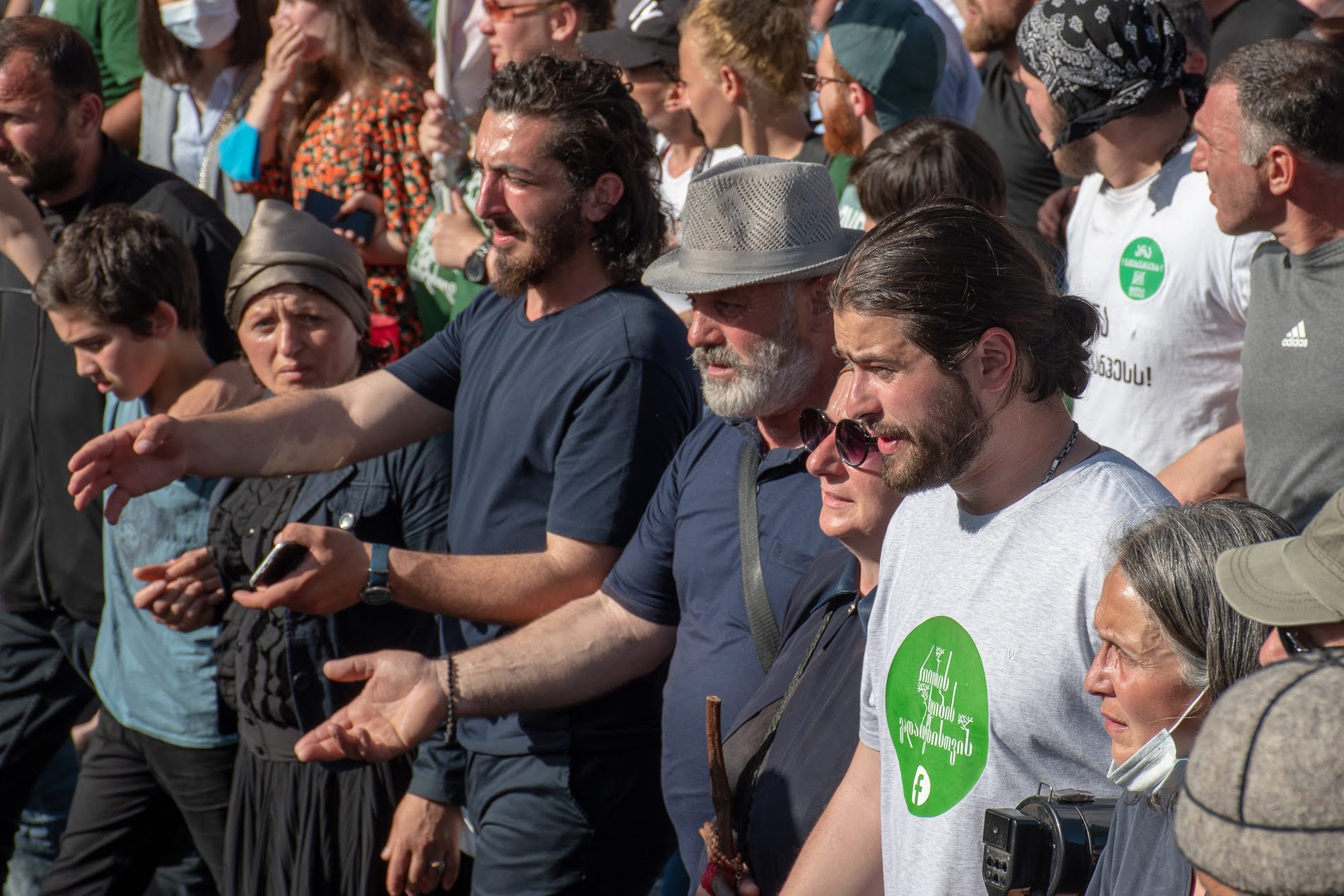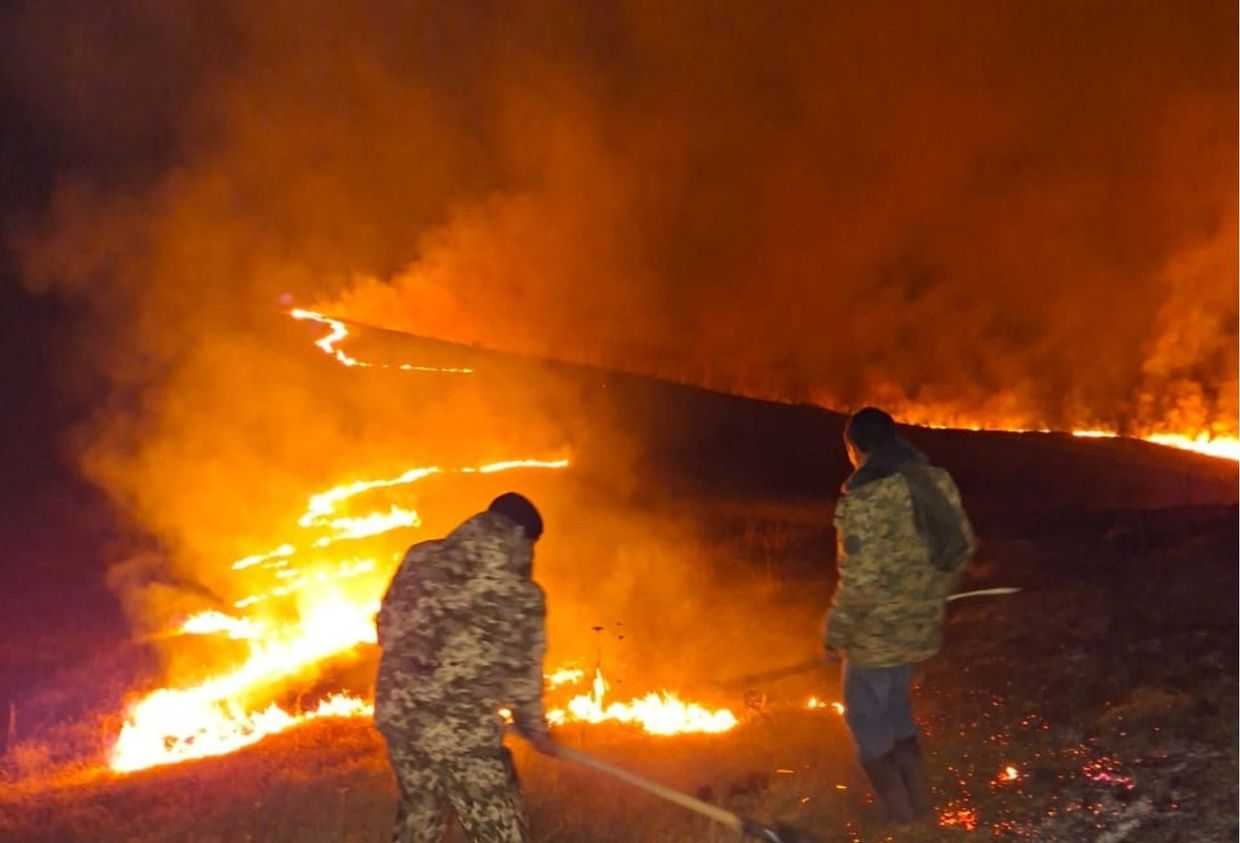
A group of environmental activists opposing the commercialisation of public lands in Racha were detained on Saturday and face future trial after peacefully protesting outside Georgia’s Ministry of Environmental Protection and Agriculture.
Police detained 11 people on 18 November on charges of petty hooliganism and disobeying police, including a number of the protest’s leaders.
The protest campaign, led by the grassroots Saving Rioni Valley movement, moved to Tbilisi earlier on Saturday after activists claimed that the authorities had failed to guarantee that the public lands, bordering Russia to their north and South Ossetia to their east, would not be ‘sold’ to anyone.
Until 18 November, the campaign had been based in the towns of Oni and Ambrolauri in Racha.
[Read more on OC Media: Racha forest protests enter fourth week in Georgia]
Campaigners travelled in a convoy from Ambrolauri to the Environmental Ministry office in Tbilisi, to demand a meeting with Otar Shamugia, Georgia’s environment minister.
On arriving, police barred the protesters from entering the ministry’s yard. Protesters responded by attempting to set up a tent, a common feature of their rallies, next to one of the yard’s gates, while others tried to block the adjacent main road, after which police began arresting them.
According to protesters, the detainees included the leader of Saving Rioni Valley, Varlam Goletiani, activists Gela Ketelauri and Nugzar Godoladze, leader of leftist group Khma, Giorgi Khasaia, and the leader of the May Student Movement, Saba Kerkadze.
‘They’ve basically identified all those active individuals who they deemed to be leading our protest demonstration, but […] we will continue [our protest]’, said Maka Suladze, one of the leaders of the protest campaign, speaking to media.
The 11 detainees were released on Sunday, with their hearings postponed to 29 and 30 November to allow for evidence to be gathered. The judge has ordered the Interior Ministry to provide video evidence to support their allegations.
A defence lawyer stated that the protestors’ arrest was illegal, as they had not exceeded limits of freedom of speech and expression.
A number of protesters stated that police had been aggressive towards them. Maka Suladze claimed that police officers mistreated her and others, including cracking the tooth of one protester, and damaging her lip and pulling away her headscarf, which she has always worn in public.
Georgian news outlet Mautskebeli reported that police also detained their journalist, Rati Ratiani, who was covering the protests.
When the protest resumed on Monday, police reportedly barred protesters from entering the grounds of the Ministry of Environmental Protection, and refused to allow them to pitch a tent, stating, according to Publika, that protesters could use only umbrellas.
‘No grounds for protest’
Soon after the arrests, the Environmental Ministry stated that there were ‘no grounds for staging protest demonstrations’ because, since May, they had already been deliberating the revocation of the permit, issued in March last year, to establish a hunting farm in Racha.
The Ministry also contested the protesters’ language, claiming that providing such a permit never implied that the forests would be ‘sold’. Instead, it stated that issuing a licence for a hunting farm meant investing over ₾5 million in the ‘development of the region and employment of local population’.
The statement additionally refuted claims that Russia-based businessman Davit Khidasheli was planning to ‘sell’ the licence, something Khidasheli had alleged three days before the protest moved to Tbilisi, according to news outlet Netgazeti. Khidasheli is a Russia-based businessperson with ties to billionaire ruling party founder and former prime minister Bidzina Ivanishvili.
In recent weeks, the Ministry and Khidasheli have publicly traded accusations regarding objections to the hunting farm.
The Ministry alleged that the company associated with Khidasheli had failed to come forward with a plan to develop the licenced area, while Khidasheli alleged the state had not clarified the obligations of his company.
Protests against the privatisation of the land have been taking place in Racha since late September. News that Khidasheli was selling the licence and the company has prompted little response from protesters, who continue to demand that the 49-year licence be formally revoked for any possible investor.
‘Many other countries are waiting for me to invest with open arms, and time will show everyone that I am not close to the Kremlin or Georgian Dream’, said Khidasheli.

This is the second time that Saving Rioni Valley have staged a protest in Tbilisi. In May 2021, the group held large demonstrations in Tbilisi against the construction of the Namakhvani hydroelectric power plant in western Georgia. The plant’s construction was subsequently paused, with an external construction company formally withdrawing in spring 2023.









